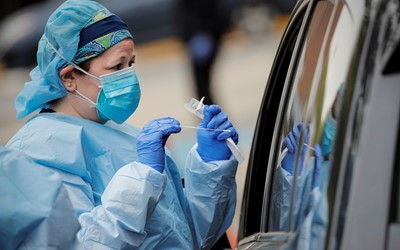During the COVID-19 pandemic, the research community came together to respond to the needs of our health and care systems during the early stages of the pandemic. Researchers identified and reviewed evidence, which was summarised in accessible reports for widespread distribution to front line clinicians and commissioners, and to help inform decision-making.
This research is done in collaboration with UCLPartners.
Evidence on COVID-19 diagnostic testing in recovered dialysis patients
This report summarises the evidence on COVID-19 and dialysis services. It aims to identify how many diagnostic tests for COVID-19 need to be conducted in dialysis patients who seem to have recovered.
Overview of findings
There is still very little evidence on this topic. Evidence suggest that patients may carry the virus 5-13 days after the symptoms disappear. Three studies conducted with dialysis patient in Italy, the US and China recommend different types of recovery confirmation (negative test) for patients to return to regular dialysis.
The most exhaustive confirmation process was proposed by the study conducted in China (Wuhan), which included two negative SARS-CoV-2 nucleic acid, negative SARS-CoV-2 antibody, and improvements in chest CT. Guidelines and research papers are being regularly updated and may report new useful information about COVID-19 and dialysis services in the coming weeks.
ARC North Thames investigators
Dr Antonio Rojas-García
Professor Rosalind Raine
Evidence on COVID-19 and rehabilitation needs
This report aims to summarise the evidence on the rehabilitation needs of COVID-19 patients who have been in intensive care, and how health systems could deliver services to meet these needs.
Overview of findings
There are no studies reporting empirical data on rehabilitation and care needs after COVID-19. A few reports, summarising shared experiences of professionals, set out recommendations to provide rehabilitation services, and some studies on post intensive care syndrome may report useful information, though they may not be specifically related to COVID-19.
ARC North Thames investigators
Dr Antonio Rojas-García
Professor Rosalind Raine
Ethical Frameworks for resource allocation in intensive care units
A summary of the international literature on ethical frameworks for resource allocation in intensive care units. This document incorporates a comparison of the NICE COVID-19 critical care guidance with other frameworks identified.
Overview of findings
All frameworks incorporate a short-term outcomes assessment. NICE guidance applies the Clinical Frailty Score (CFS), whereas most others use the Sequential Organ Failure Assessment (SOFA).
Some frameworks, including the NICE guidance, have been developed with input from key stakeholders, including lay members. There is general agreement that criteria should be objective and clinical. Most frameworks argue that the ability to benefit from interventions should be the primary guide to treatment (rather than other factors such as age for example).
There is broad agreement that to provide most benefits for most people, it is necessary that treatment of the sickest people be limited in times of scarce resources. It is recognized that all patients still deserve the best care possible, including palliative care intended to reduce suffering.
ARC North Thames investigators
Dr Danielle Lamb
Professor Rosalind Raine
Evidence on medium to long term physical health impacts of COVID-19
This review aims to summarise the evidence on the longer-term physical health effects of COVID-19 after recovery from acute illness, and what NHS service support recovered patients will need.
Overview of findings
There is very limited data on outcomes of patients following the recovery from the acute phase of COVID-19, reflecting how we are still only a few weeks into the pandemic.
Recovery rates fall with increasing disease severity, with an estimated 50 per cent survival following mechanical ventilation. Complications among patients on intensive care units (ICU) include cardiovascular events and acute renal injury and a proportion of those who survive ICU are likely to have ongoing medical needs in the short term.
A case series of ICU survivors of SARS CoV infection in 2002-3 identified that return to normal respiratory function took up to one year. Considerations for post-acute care include planning for a likely surge in demand for inpatient rehabilitation, outpatient rehabilitation, outpatient nursing care (including palliative care), supported discharge and home care services (including palliative care).
There is evidence from Italy of pressure on rehabilitation services due to recovering COVID-19 patients, and some available guidance documents for planning purposes. Specific considerations for rehabilitation services include:
- how to support home exercise during self-isolation eg through tele-rehabilitation
- how to implement appropriate infection control given likely vulnerability among rehabilitation patients
- how to ensure adequate PPE supplies for speech and swallowing therapists and chest physiotherapists
- how to appropriately decontaminate equipment
ARC North Thames investigators
Dr Niran Rehill


